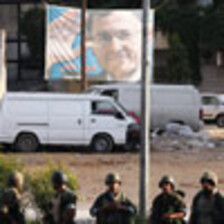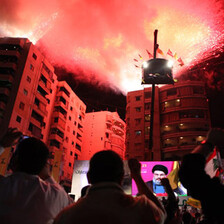Middle East Reasearch and Information Project (MERIP) 21 July 2006

Destroyed building in the center of Haret Hreik in southern Beirut. (Photo: Information Clearing House)
Israel is raining destruction upon Lebanon in a purely defensive operation, according to the White House and most of Congress. Even some CNN anchors, habituated to mechanical reporting of “Middle East violence,” sound slightly incredulous. With over 300 Lebanese dead and easily 500,000 displaced, with the Beirut airport, bridges and power plants disabled, the enormous assault is more than a “disproportionate response” to Hizballah’s July 12 seizure of two soldiers and killing of three others on Israeli soil. It is more than the “excessive use of force” that UN Secretary-General Kofi Annan decries. The aerial assault dwarfs the damage done by Hizballah’s rocket attacks on Israeli towns. Entire villages in south Lebanon lie in ruins, unknown numbers of their inhabitants buried in the rubble and tens of others incinerated in their vehicles by Israeli missiles as they attempted to escape northward. As it awaits the promised “humanitarian corridor,” Lebanon remains almost entirely cut off from the outside world by air, sea and land. As of July 20, thousands of Israeli troops have moved across the UN-demarcated Blue Line. Yet virtually the entire American political class actively resists international calls for an immediate ceasefire, preferring to wait for an Israeli victory.
Israeli Prime Minister Ehud Olmert set the tone immediately after Hizballah struck, branding the cross-border raid as “an act of war” whose consequences would be “very, very, very painful.” Moreover, Israel would hold the Lebanese government and the Lebanese nation as a whole responsible. Israel’s determination to inflict pain upon Lebanon was fanned on the fourth day of Israeli bombardment when Hizballah Secretary-General Sheikh Hasan Nasrallah likewise declared “open warfare,” and the Shiite movement’s militia stepped up rocket fire that has taken 15 Israeli civilian lives. Though the Katyushas and larger projectiles are much deadlier than the Qassams of Hamas, Israel faces no existential threat from the rockets on either front. It is in Lebanon, to paraphrase Israeli army chief of staff Gen. Dan Halutz, where the clock has been turned back 20 years.
The American broadcast media nevertheless labor to fashion symmetry where there is none. There is balanced treatment of the casualties on both sides. The Israelis forced into bomb shelters are juxtaposed with the Lebanese politely warned to flee their homes. For competing renditions of the day’s bloodletting, CNN’s avuncular Larry King turns first to nonchalantly windblown Israeli spokeswoman Miri Eisen and then to a program director from Hizballah’s al-Manar satellite channel, Ibrahim al-Musawi, who always seems to have one eye on the sky. The rock-star reporters who parachuted in to cover the story dispense dollops of confusion. CNN’s Anderson Cooper in Cyprus explained that, since Hamas members are Sunni and Hizballah members Shi’i, they are “historic rivals.” MSNBC’s Tucker Carlson, sans bowtie to convey the seriousness of the occasion, wondered if Hizballah had rocketed Nazareth because its residents are all Christian, ignoring the images on the screen behind him from the attack victims’ funeral at a mosque.
The likes of Carlson can perhaps be forgiven for grasping at clash-of-civilizations straws. The White House’s immediate fingering of Iran and Syria as the masterminds of Hizballah’s self-described “adventure” substituted phantoms and bogeymen for real political causes. Israel was similarly quick to espy an “axis of Islamic terror” stretching to Damascus and Tehran. Former Speaker of the House and would-be presidential candidate Newt Gingrich went officialdom one better, declaring on NBC’s Meet the Press that the US and its allies are in “World War III.” A steady stream of Congressmen goes before the cameras to aver that Tehran and Damascus are pulling the strings.
No evidence, beyond leaked Israeli intelligence of secret meetings between Nasrallah and his alleged Syrian and Iranian puppeteers, has been presented for the thesis of broader conspiracy, let alone for the core proposition that Hizballah snatched the Israeli soldiers on orders from Bashar al-Asad and/or Ayatollah Ali Khamenei. (Who else sees the hand of Iran, by the way? Saddam Hussein, admonishing Syria from his Baghdad jail cell not to “deepen its coalition with Iran, because Iranians have bad intentions toward all Arabs and they hope to do away with them.”) The fact that Hizballah’s arsenal includes missiles of Iranian and Syrian provenance is also adduced as proof. By this same logic, of course, Washington must be ordering every sortie of Israeli F-16s over Beirut and every demolition of Palestinian homes by Caterpillar bulldozers.
Hizballah is not shy about acknowledging its external patrons, who presumably assented to its operation. But the timing of the militia’s cross-border raid, as Israel was punishing all of Gaza for the capture of one soldier, suggests another motivation rooted in regional politics — namely, that Hizballah aimed to impress the Arab public as capable champions of the Palestinians, in contrast to the impotent grumbling of the US-allied Arab regimes. Surely, as well, Saudi and Egyptian criticisms of Hizballah stem more from the popularity of Nasrallah among their own (all or mostly Sunni) populations than from a genuine fear of a “Shiite crescent.”
The scholars who know Hizballah best say the movement is more Lebanese and nationalist now than any time in its history. Even before the departure of Syrian troops in the spring of 2005, Hizballah was increasingly speaking with nationalist rhetoric. While their political opponents staged what they call the Independence Uprising, Hizballah-mobilized demonstrators “thanked” the Syrians for their services, rather than demanding that they stay, and waved Lebanese flags alongside the party’s yellow banners. Hizballah has been pressing the issue of Lebanese prisoners in Israeli jails, along with Lebanon’s claim to the Israeli-occupied Shebaa Farms along the Syrian-Lebanese border, for some time. The Lebanese government backs both of these causes.
But it is odd, to say the least, to hold the Lebanese government responsible for Hizballah’s initial cross-border operation. To the contrary, the evidence suggests that the Islamist party acted unilaterally, despite having representatives in the cabinet and in Parliament. This circumstance suggests that the raid should be interpreted as Hizballah muscle flexing on the domestic stage to ward off pressure to relinquish its arms to the Lebanese army, as per the requirements of UN Security Council Resolution 1559. Perhaps, having exchanged prisoners with Israel as recently as 2004, the movement miscalculated how Israel would react, and now they are getting more than they bargained for. Certainly, Lebanon is.
Whichever combination of these factors accounts for Hizballah’s action, the real question is what Israel hopes to accomplish by bombing the whole of Lebanon in reprisal. The strategy behind the assault, apart from blind retribution, is difficult to fathom. Even though Israeli jets buzzed Asad’s presidential palace after Hamas captured an Israeli soldier, and even though evidence of Syrian influence over Hamas is far wispier than its ties to Hizballah, Israel seems disinclined to draw Damascus into the fighting. “We’re not a gang that shoots in every direction,” an Israeli officer told Ha’aretz. Nor, despite bellicose talk of “root causes” and rumors of Iranian Revolutionary Guards firing from Hizballah launching pads, does Israel or the US appear prepared to do more than trade insults with Tehran. There is a risk of catastrophic escalation, but it is reasonable to hope it is not planned.
Rather, the stated objective (beyond the recovery of the captive soldiers) is the implementation of a UN resolution, an instrument of international diplomacy for which Israeli spokespeople have developed a touching new fondness. If the Lebanese government will not disarm Hizballah, then Israel will. If the Lebanese will not “exercise their sovereignty,” as Eisen demanded on CNN, then Israel will appropriate that sovereignty and exercise it in Lebanon’s stead. Perhaps because the US has its own history of invading Middle Eastern countries to “enforce UN resolutions,” the American media seem to regard Israel’s case as entirely sensible. One wonders how the media would have treated similar external intervention to impose UN Security Council Resolution 425, which called for Israeli withdrawal from Lebanon in 1978, and, of course, was not honored until 2000, under the pesky fire of Hizballah.
But that is what-if history. Back in the present, says the tough-talking Israeli ambassador in Washington, David Ayalon: “We’ll have to go for the kill — Hizballah neutralization.” Thus far, independent assessments of “operational success” are bleak. On July 20, the Times of London quoted “a senior British official” as saying: “Our concern is that Israeli military action is not having the desired effect … . We are concerned that continued military operations by Israel will cause further damage to infrastructure and loss of civilian life which the damage to Hizballah will not justify.” The well-connected military affairs columnist for Ha’aretz, Ze’ev Schiff, penned a similarly pessimistic appraisal.
Hence the large-scale Israeli ground incursion that commenced on July 20. While Halutz told the troops that the incursion could last for “an extended period of time,” Israeli Defense Minister Amir Peretz has stressed that it will not lead to permanent reoccupation of south Lebanon. Indeed, from the Israeli government’s perspective, one benefit of Israel’s withdrawal from Lebanon in May 2000, like its pullout from Gaza in August 2005, is the latitude to deploy the full force of bombs and tanks unavailable as long as Israel was the occupying power. The architect of Gaza disengagement, former Prime Minister Ariel Sharon, came to appreciate this logic despite having vehemently denounced the peril to Israel’s “deterrence capability” when the Labor government brought troops home from Lebanon. Whether the ground incursion will “degrade” Hizballah’s fighting effectiveness or strengthen their argument that Lebanon needs their independent militia for its own national defense remains to be seen. It seems that Israeli strategists are making up the military objectives as they go along, with one eye on the degree of “operational success” and another eye on what Washington will let its tank commanders and bombardiers get away with.
Asked how long Israel’s campaign could continue, a high-ranking US official told the Washington Post: “There’s a natural dynamic to these things. When the military starts, it may be that it has to run its course.”
Many European chanceries, like Annan, evoking rules-of-war distress at Israel’s “excessive use of force,” are calling for an immediate ceasefire. These calls were faint indeed amidst a week of air raids and the Group of Eight’s toothless tut-tutting about “extremist forces.” From Washington came the bright green go-ahead to keep on bombing. Asked how long Israel’s campaign could continue, a high-ranking US official told the Washington Post: “There’s a natural dynamic to these things. When the military starts, it may be that it has to run its course.”
So we arrive at the Bush administration’s breathtakingly cavalier stance and, again, the human cost of its decision to use Lebanon’s agony to tilt at Iranian and Syrian windmills. On July 15, by several accounts, US Ambassador to the UN John Bolton blocked Security Council discussion of the ceasefire resolution for which Lebanese Prime Minister Fuad Siniora has pleaded in every available forum. Since then, despite blatant violations of principles of proportionality and growing international alarm about the internally displaced Lebanese, Secretary of State Condoleezza Rice pledges only to work for a ceasefire “as soon as possible when conditions are conducive to do so.” The conditions, of course, grow less “conducive” the longer Washington’s green light glares.
Such signals to Israel are not unprecedented, of course, but in this case they are completely and rather shockingly public. The secretary of state has disagreed with the Egyptian foreign minister about the urgency of a ceasefire while standing before the same bank of microphones in Foggy Bottom. Making the Sunday talk show rounds on July 16, Rice again shopped an applause line from her June 2005 American University in Cairo address: “For the last 60 years, American administrations of both stripes — Democratic, Republican — traded what they thought was security and stability and turned a blind eye to the absence of democratic forces, to the absence of pluralism in the region.” This policy, she still claims, has been reversed. In reality, with its unabashed approval of Israel’s pounding of Lebanon, the Bush administration has reversed 60 years of basing US policy toward the Arab-Israeli conflict on the premise — however fictional in practice — that the US seeks peace between the parties. Meanwhile, as Rice dithers over setting a date certain for a Middle East diplomatic mission, the US green light may actually exacerbate the carnage in Lebanon, since Israeli military commanders know that they will have limited time to accomplish their goals.
On July 19, a reporter asked White House Press Secretary Tony Snow if Bush’s insistence that Rice not undertake shuttle diplomacy until Israel “defangs” Hizballah made the conflagration in Lebanon a US war as well as an Israeli one. Snow dissembled: “Why would it be our war? I mean, it’s not on our territory. This is a war in which the United States — it’s not even a war. What you have are hostilities, at this point, between Israel and Hizballah. I would not characterize it as a war.”
It is a war, an unjustified war. Israel’s legal justifications — protecting the sanctity of its borders and enforcing UN resolutions — are disingenuous to the point of being dishonest, after Israel’s own years of ignoring the will of the international community and crossing and erasing boundaries with impunity. The US is the only international actor with the power to stop this war, and instead has chosen to encourage the fighting. So the US, too, will be held accountable by history.
Related Links
This article was originally published by The Middle East Report Online and is republished with permission.


